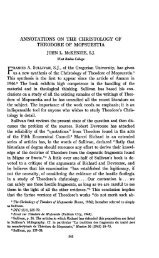Two Concepts of Attrition and Contrition - Theological Studies
Two Concepts of Attrition and Contrition - Theological Studies
Two Concepts of Attrition and Contrition - Theological Studies
You also want an ePaper? Increase the reach of your titles
YUMPU automatically turns print PDFs into web optimized ePapers that Google loves.
32 THEOLOGICAL STUDIES<br />
describe the repentance necessary <strong>and</strong> sufficient for the sacrament in a<br />
formula acceptable to both schools by saying: <strong>Attrition</strong> sufficient for<br />
justification in the sacrament is the repentance by which a sinner is<br />
sorry for his sins <strong>and</strong> detests them as much as he can with the help <strong>of</strong><br />
grace that is given him, inspiring his will <strong>of</strong> repentance with any motives<br />
whose consideration helps him, the more perfect the motives the better.<br />
This amounts to the desire <strong>of</strong> contrition. And this psychological disposition<br />
can remain the same before <strong>and</strong> after the absolution, that is,<br />
before <strong>and</strong> after he receives the habitus <strong>of</strong> charity <strong>and</strong> <strong>of</strong> sanctifying<br />
grace. Both when his sorrow is still attrition not perfected by charity<br />
<strong>and</strong> when it is contrition formed by charity, a penitent can <strong>and</strong> need<br />
not do anything more than hate his sins as much as he can. But this<br />
same psychological state or activity covers two deeply different realities<br />
before <strong>and</strong> after justification, namely, ineffective <strong>and</strong> incomplete<br />
renouncement <strong>of</strong> sin without charity in attrition, or effective <strong>and</strong> complete<br />
turning away from sin with charity in contrition.<br />
Let it be noted at once that this sufficient attrition is certainly<br />
found where the conditions postulated by moderns for the repentance<br />
that will suffice in the sacrament are fulfilled. 103 And the practical way<br />
<strong>of</strong> the common pastoral theology, as shown, for example, in the acts <strong>of</strong><br />
contrition which our catechisms <strong>and</strong> our prayerbooks propose to the<br />
faithful, exactly formulates the expression <strong>of</strong> sorrow for sin in such manner<br />
as to teach them to be sorry for their sins as much as they can.<br />
From a practical viewpoint, then, this attempt at synthesizing the<br />
teachings <strong>of</strong> both the old <strong>and</strong> the new theology on attrition-contrition<br />
means nothing new. From a doctrinal point <strong>of</strong> view it endeavours to<br />
remain faithful to the firm <strong>and</strong> in no way antiquated penitential<br />
theology <strong>of</strong> St. Thomas, <strong>and</strong> at the same time to take into account the<br />
new suggestions <strong>of</strong> the moderns. The modern theology on penance may<br />
mean a progress in certain regards. By stressing the psychological side<br />
<strong>of</strong> repentance <strong>and</strong> insisting on its motivation so as to <strong>of</strong>fer practical<br />
ways <strong>of</strong> arousing true sorrow, it brings out the human element <strong>and</strong> cooperation<br />
needed in the process <strong>of</strong> a sinner's return to God. And in this<br />
free cooperation with grace, as for any other human activity, motivation<br />
plays an important role. It may also be granted that the veteres<br />
103 Cf. De Blic, op. cit., p. 341; Galtier, quoted above n. 101, <strong>and</strong> also, La Confession,<br />
pp. 24-25.

















